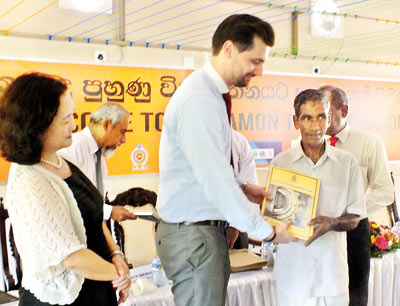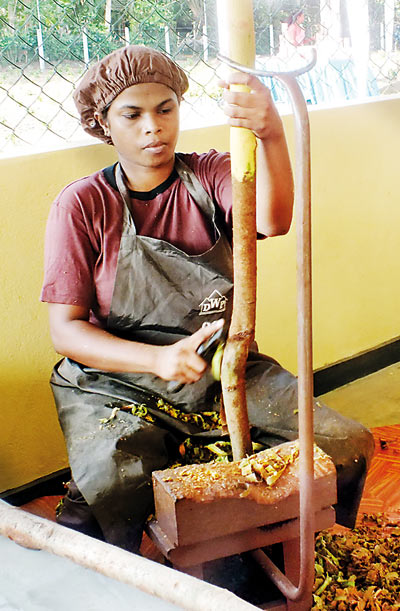To go or not to go? Govt. politicians provide contrasting views on West Asian labour migration policy

J. D. Gunadasa receiving the Competence Certificate from Gabo Molnar, Expert on Project Management, UNIDO
Contrasting statements by government politicians on economic and state policy surprised the audience attending an event connected to the proposed Cinnamon Trading Academy at Kosgoda, near Bentota last week. Initially Sarath Amunugama, Minister of Special Projects deputising for President Maithripala Sirisena (chief guest), speaking at the laying of the foundation stone for Stage 2 of the Cinnamon Training Academy at Kosgoda, said they were proud that Sri Lankan women working in West Asia earned to the tune of US$ 7 billion (annually) whereas the cinnamon industry earns only a meagre amount and that this sector should at least reach a billion dollars in earning.
Dr. Amunugama, left the event after he spoke, and when Southern Province Governor Hemakumara Nanayakkara took the podium, he had a different story to tell. He said the country should be ashamed to send mothers, sisters and daughters for slave labour which has (often) resulted in a father using the daughter as ‘the wife’. He said that it was miserable to see some Sri Lankan women return to the country with children fathered allegedly by Arab employers and hear dreadful stories of slave labour from these women which has affected their family lives forever.
Mr. Nanayakkara noted that individuals should not spell out economic policies on their own, but they have to be spelled out by successive governments.

Removing the outer bark before peeling the cinnamon at the academy in Kosgoda
Earlier in his speech, Dr. Amunugama also said that the economy and export trade should be geared to suit world trade and globalisation.
He said that there were too many regulations, bureaucracy and obtaining permits from various authorities when starting businesses and exporting products. These negative processes should be stopped, saying: “Parana hampada neethi haa niladhari – waaaya ainkarala daanda oni”. Sri Lanka is a small country with a small population and the economic survival of the country depends on increasing the exports as there is no large domestic market like India and China. He asserted that Sri Lanka is lagging far behind countries like Cambodia, Vietnam, etc which are far ahead. The country should not hold onto traditional cash crops like tea, rubber and coconut (for economic survival) owing to the high cost of production and competition in the global market which has become extremely tough.
Ayumi Fujino, Regional Director for South Asia, Delhi, UNIDO said that her organisation started supporting the revitalisation of Ceylon Cinnamon’s position on the global market in collaboration with the Standard and Trade Development Facility, WTO and the Spice Council of Sri Lanka back in 2010. The project envisaged three key objectives: enhancement of productive capacities, improvement of compliance towards food safety and hygiene standards and increasing the competitiveness of Ceylon Cinnamon globally. Ms. Fujino said, “UNIDO considers it very critical to emphasise the importance of food safety and is fully committed to contribute towards achieving the production of safe food which is one of the most important interventions of our project.
Thus six processing centres have been upgraded for Good Manufacturing Practices Certification”. Sarada De Silva, Chairman, Cinnamon Training Academy, considered the prime mover in this academy, elaborated on the history of cinnamon industry in Sri Lanka,how the industry has progressed and how the southern province became the cinnamon hub of Sri Lanka. He said that this academy is essential to attract youth to work in the cinnamon industry. It would also facilitate the food safety quality enhancement.


